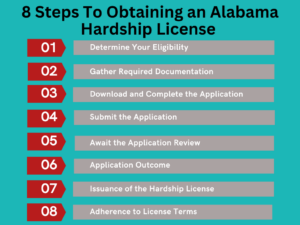
Alabama Hardship License: A Step-by-Step Guide
Regaining driving privileges in Alabama after a license suspension can be difficult. However, the introduction of the Hardship License, Alabama has opened a new avenue for residents to maintain their essential daily routines. This special hardship license can enable individuals with suspended licenses to drive under specific, legally defined circumstances. Since its implementation in 2019, the Alabama Hardship Driver’s License has significantly altered the landscape for those facing the many challenging repercussions of a license suspension. It aims not just to provide a legal solution but to ensure that life’s critical activities—such as employment, education, and healthcare needs—can continue uninterrupted.
In this article, we’ll take a closer look at specifics of the Hardship License in Alabama and how to navigate the complexities of suspended driving privileges. We’ll uncover who’s eligible, the scope of this license’s application, and the meticulous process involved in obtaining one. Whether it’s for commuting to work, attending school, or ensuring timely medical appointments, the Hardship License in Alabama stands as a testament to Alabama’s commitment to balancing legal enforcement with the genuine needs of its residents. Join us as we navigate the path to obtaining a Hardship License in Alabama, a journey that reinstates not just driving privileges but also hope and normalcy in the lives of many.
Hardship License Alabama: Scope and Limitations
The Hardship License in Alabama can offer considerable relief for those with suspended licenses, yet it comes with its own set of regulations and boundaries. In this section, we’ll explain how the Hardship License in Alabama works and outline the limitations tied to this special license as , ensuring that potential applicants fully grasp where, when, and how they can utilize it.
Scope of the Alabama Hardship License
The Hardship License in Alabama permits driving in the state under the following circumstances, emphasizing the support of essential life functions and responsibilities:
- Work-Related Travel: Allows for commuting to and from your workplace, job training sessions, readiness programs, and even job interviews, ensuring that your professional life remains unaffected.
- Educational Pursuits: Facilitates travel to educational institutions for enrolled students or family members, including schools and childcare facilities, and extends to sanctioned school events, preserving the uninterrupted progress of education.
- Healthcare Accessibility: Grants permission to drive for medical or mental health treatments, pharmacy visits for prescriptions, and in dire situations, to address medical emergencies to help residents preserve their health and well-being.
- Community and Legal Engagement: Enables attendance at court-ordered programs, treatments, community service, or events, encompassing rehabilitation programs and necessary legal appearances to support compliance and rehabilitation.
- Essential Household Needs: Allows for travel to procure groceries, household necessities, and the fulfillment of vital household responsibilities, ensuring basic living standards are maintained.
- Civic Participation: Specifically includes travel for voting purposes, emphasizing the importance of civic engagement and participation in democratic processes.
Limitations of the Hardship License in Alabama
While the Hardship License in Alabama serves as a critical aid, there are limitations. Below, we’ve listed the boundaries to keep in mind in order to avoid any legal infractions:
- Non-Commercial Usage: The license strictly prohibits any form of commercial driving, underscoring its sole purpose for personal and essential use.
- Geographical Restriction: The privileges of the Hardship License in Alabama are confined within the borders of state, highlighting its inapplicability for out-of-state travel.
- Specific Usage: It’s imperative to remember that the license does not cater to recreational or non-essential travel. Its use is strictly limited to the outlined purposes, ensuring that the privilege is not misused.
Understanding the scope and limitations of the Hardship License in Alabama is fundamental for compliance and maintaining its validity. It’s a tailored solution designed to balance legal adherence with the indispensable needs of daily life, allowing individuals to navigate through their suspension period without disrupting their fundamental life activities. As we move forward, potential applicants must recognize the importance of adhering to these defined boundaries to ensure the continued benefit of this privilege.
Application Process for an Alabama Hardship License, Alabama
Securing a Hardship License in Alabama requires completing a detailed application. This section aims to guide you through each step, ensuring clarity and precision to enhance your chances of approval. From gathering necessary documentation to submitting your application, here’s how to navigate the path to obtaining your Hardship License:
Step 1: Determine Your Eligibility
Before beginning the application process, ensure you meet one of the eligibility criteria:
- Participation in specific Alabama Department of Corrections programs.
- Inability to obtain reasonable transportation following a license suspension/revocation.
Step 2: Gather Required Documentation
Prepare the necessary documents, which may include:
- Proof of participation in eligible programs (if applicable).
- Documents demonstrating the necessity for a Hardship License (Alabama) based on your transportation needs.
- Any other supporting documents as specified by the Alabama Law Enforcement Agency (ALEA).
Step 3: Download and Complete the Application
Download the Application for Hardship License. Fill it out meticulously, ensuring all information is accurate and complete.
Step 4: Submit the Application
Submit your completed application along with the required documentation through one of the following methods:
- Email: Send to hardship.license@alea.gov.
- Fax: Send to 334-353-9988.
- Mail: Post to ALEA Driver License Division – Hardship License Unit, PO Box 1471, Montgomery, AL 36102.
Step 5: Await Application Review
Upon submission, your application will undergo a thorough review process. The reviewing officer will assess your eligibility based on the administrative rules and the documentation provided.
Step 6: Application Outcome
- Approval: If approved, you will receive an approval letter from ALEA. You will then have 30 days to visit an ALEA Driver License office with the approval letter to have the Hardship License issued. Be prepared to possibly retest.
- Additional Documentation Required: If further documentation is needed, you will be notified via mail.
- Denial: In the case of a denial, you will be informed of the reasons and any possible steps for reconsideration.
Step 7: Issuance of the Alabama Hardship License
Once approved, visit the designated ALEA Driver License office with your approval letter. Fulfill any additional requirements, such as retesting if necessary, to have your Hardship License officially issued.
Step 8: Adherence to License Terms
Understand and adhere strictly to the terms of your Hardship License. Non-compliance can lead to the suspension or revocation of the license.
Navigating the application process for a Hardship License in Alabama requires attention to detail and adherence to the stipulated guidelines. By following these steps, you can ensure a smooth process and improve your chances of gaining the limited driving privileges you need to manage essential aspects of your life during a suspension period. Remember, the Hardship License is a privilege aimed at easing the burdens during challenging times while ensuring safety and compliance with state laws.
Cost of a Hardship License in Alabama
This section provides an overview of the costs associated with the Hardship License, insurance requirements, and details about the license’s validity and renewal process. Understanding these financial aspects is crucial for applicants to plan accordingly and ensure continuous compliance with the stipulations of the Hardship License.
License Fees
- Initial Application Fee: The cost of obtaining a Hardship License in Alabama is the same as a regular Class D License, which is $36.25.
- Renewal Fee: The Hardship License has an initial validity period of one year. If eligible for renewal, the license can be renewed annually for up to three additional consecutive years at no additional cost, provided the applicant demonstrates good cause and progress in resolving the issues leading to the original suspension.
Insurance Requirements
- Mandatory SR-22 Insurance: While holding a Hardship License, Alabama requires you to carry a mandatory SR-22 insurance policy. This is a high-risk insurance policy that proves you meet the minimum coverage required by law.
- Duration of SR-22 Insurance: The typical term for maintaining an SR-22 policy is three years, but depending on individual circumstances, this requirement may extend up to five years or more. It is crucial to maintain this insurance coverage for the entire mandated period.
- Consequences of Policy Lapse: If the SR-22 policy lapses or is canceled for any reason, your license will be suspended, and you may need to restart the application process. Ensure continuous coverage to avoid these complications.
Additional Considerations
- Ignition Interlock Device: Depending on the specifics of your case, particularly for alcohol-related offenses, the state may require the installation of an ignition interlock device in your vehicle.
- DUI Program: Completion of a DUI program might be mandated as part of the conditions for obtaining or maintaining the Hardship License.
Compliance and Monitoring
- The Hardship License, like any driving privilege, is subject to continuous monitoring and compliance with the state’s laws and regulations. Non-compliance or any infraction can lead to further legal consequences and the potential revocation of the Hardship License.
If you’re considering applying for a Hardship License, Alabama will require both application and renewal fees, as well as insurance requirements and any additional conditions imposed by the state.
About Jay Pickering Law Firm
Jay Pickering Law Firm represents accident victims who have suffered injuries from car accidents, truck accidents, and motorcycle accidents. Our office is located in Birmingham, and we serve local communities in cities, towns, and rural areas throughout the state. If you or a family member has been involved in an accident, we’re here to protect your rights and ensure you receive the compensation you deserve. If you have questions, we’re available 24/7 for a free case review.

Attorney Jay Pickering brings over 27 years of unwavering dedication to personal injury law, with a sharp focus on representing those injured in car, truck, and motorcycle accidents across Alabama. A proud alum of the University of Alabama School of Law, Jay is a member of the Alabama State Bar and the American Bar Association.

